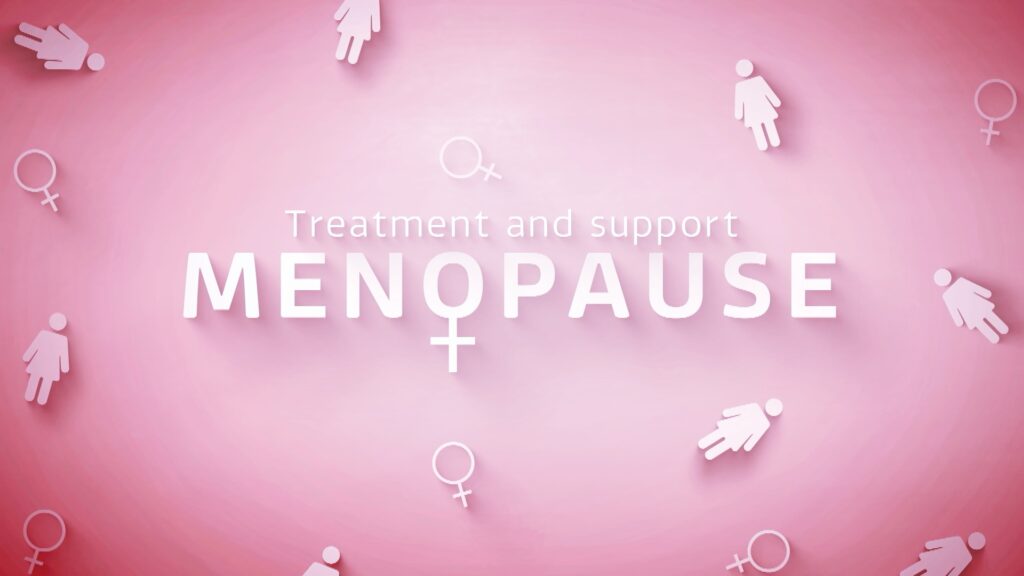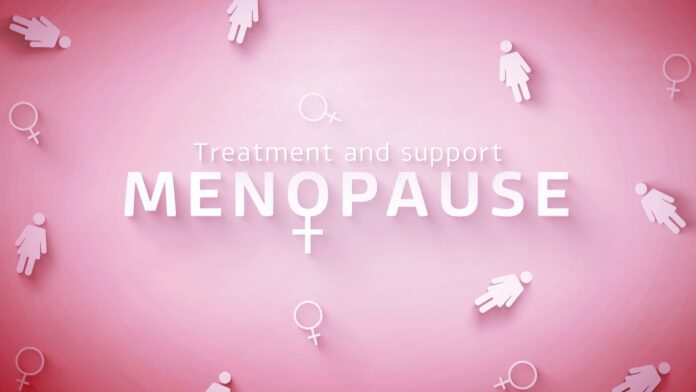Menopause Symptoms and 7 Natural remedies

what is menopause and what are causes and its symptoms? Reduced Menopause natural treatment.
Menopause is a natural biological process that marks the end of a woman’s reproductive years. It typically occurs between the ages of 45 and 55, but can also happen earlier or later. During menopause, a woman’s ovaries stop producing eggs and her menstrual cycle ceases. This hormonal shift can cause a variety of symptoms, which can range from mild to severe.
The exact cause of menopause is not fully understood, but it is believed to be a result of the natural aging process. As women age, their ovaries produce fewer hormones, including estrogen and progesterone, which play key roles in the menstrual cycle. Eventually, the ovaries stop producing these hormones altogether, leading to menopause.
Other factors that can contribute to early menopause include genetics, certain medical treatments, and lifestyle factors such as smoking and excessive alcohol consumption. Some medical conditions, such as thyroid disease and autoimmune disorders, can also cause early menopause.
The symptoms of menopause can vary widely from woman to woman. Some women experience few or no symptoms, while others may experience a range of physical and emotional changes.
Some common symptoms of menopause include:
Hot flashes: A sudden feeling of heat that spreads throughout the body, often accompanied by sweating and flushing.
Night sweats: Hot flashes that occur during sleep, which can disrupt sleep and cause fatigue.
Vaginal dryness: A decrease in estrogen levels can cause vaginal dryness, itching, and discomfort during sexual activity.
Mood changes: Hormonal changes during menopause can cause mood swings, irritability, and depression.
Difficulty sleeping: Insomnia or difficulty staying asleep can be a common symptom of menopause.
Urinary problems: A decrease in estrogen levels can cause urinary incontinence or a frequent need to urinate.
Decreased libido: Some women may experience a decrease in sex drive during menopause.
Reduced menopause natural remedies
Several natural treatments can help alleviate symptoms of menopause. Here are some of the most effective:
Soy: Soy contains compounds called isoflavones, which are believed to have estrogen-like effects on the body. Women who consume soy products may experience a reduction in menopausal symptoms, including hot flashes and vaginal dryness. Soy is available in many forms, including tofu, soy milk, and soy supplements. Women should be aware that some studies have suggested that high doses of soy may increase the risk of breast cancer, so it is important to talk to a healthcare provider about the appropriate amount of soy to consume.
Black Cohosh: Black Cohosh is a herb that has been used for centuries to treat menopausal symptoms, including hot flashes, night sweats, and mood swings. It is believed to work by mimicking the effects of estrogen in the body. While studies on black cohosh have had mixed results, some women report significant relief from menopausal symptoms when taking this herb. Women should be aware that black cohosh may interact with some medications and may not be safe for women with a history of liver problems.
Exercise: Regular exercise can help alleviate symptoms of menopause, including hot flashes, mood changes, and insomnia. Exercise can also help maintain bone density and reduce the risk of osteoporosis, a common complication of menopause.
Meditation: Meditation and other relaxation techniques can help reduce stress and promote feelings of calm and well-being. This can be particularly helpful for women experiencing mood changes and anxiety during menopause.
Diet: Eating a healthy, balanced diet that is rich in fruits, vegetables, whole grains, and lean protein can help reduce symptoms of menopause. It is also important to avoid foods that can trigger hot flashes, such as spicy foods and alcohol.
Acupuncture: Acupuncture involves the insertion of thin needles into specific points of the body to promote healing and balance. It is effective in reducing hot flashes and other symptoms of menopause.
Supplements: Certain supplements, such as vitamin D, calcium, and magnesium, can help maintain bone density and reduce the risk of osteoporosis. Omega-3 fatty acids, found in fatty fish such as salmon and tuna, can also help reduce inflammation and promote heart health.
While natural treatments can be effective in reducing symptoms of menopause, it is important to talk to a healthcare provider before starting any new treatments or supplements. Some natural remedies may interact with medications or have unwanted side effects.
In addition to natural treatments, there are also medical treatments available for menopause. Hormone replacement therapy (HRT) is a common treatment that involves taking estrogen and/or progesterone to replace the hormones that the body is no longer producing.
HRT can be effective in reducing symptoms of menopause, but it also carries risks, including an increased risk of blood clots, stroke, and breast cancer. Women considering HRT should talk to their healthcare provider about the benefits and risks.
Another medical treatment for menopause is selective estrogen receptor modulators (SERMs). SERMs work by mimicking the effects of estrogen in some parts of the body while blocking it in others. They can be effective in reducing hot flashes and other symptoms of menopause, as well as reducing the risk of osteoporosis. However, they also carry risks, including an increased risk of blood clots and stroke.
In conclusion, menopause is a natural biological process that marks the end of a woman’s reproductive years. It is caused by a decrease in hormone production, primarily estrogen and progesterone, which can lead to a range of physical and emotional symptoms.
While menopause is a normal part of aging, the symptoms can be disruptive and affect a woman’s quality of life. Natural treatments, such as soy, black cohosh, exercise, meditation, and supplements, can be effective in reducing symptoms of menopause.
However, it is important to talk to a healthcare provider before starting any new treatments, as they may interact with medications or have unwanted side effects. Medical treatments, such as HRT and SERMs, are also available and can be effective, but they also carry risks that should be discussed with a healthcare provider. With the right treatment and support, women can navigate the transition of menopause and maintain their health and well-being.
It is also important for women to maintain a healthy lifestyle during menopause. This includes eating a healthy, balanced diet, getting regular exercise, getting enough sleep, and managing stress. Maintaining a healthy weight can also be important, as women who are overweight or obese may be more likely to experience hot flashes and other symptoms of menopause.
Women who smoke should also consider quitting, as smoking can exacerbate symptoms of menopause and increase the risk of osteoporosis and other health problems. Limiting alcohol consumption can also be helpful, as alcohol can trigger hot flashes and disrupt sleep.

In addition to physical symptoms, menopause can also be a time of emotional changes. Women may experience mood swings, irritability, anxiety, and depression during menopause. Women need to talk to their healthcare provider about these changes, as they may be a sign of a more serious condition, such as depression or anxiety disorder.
Women may also benefit from talking to a counselor or therapist about the emotional changes they are experiencing during menopause. Counseling can provide a safe space to explore feelings and concerns and can provide tools and techniques to manage stress and anxiety.
In conclusion, menopause is a natural process that marks the end of a woman’s reproductive years. It is caused by a decrease in hormone production, which can lead to a range of physical and emotional symptoms. Natural treatments, such as soy, black cohosh, exercise, meditation, and supplements, can be effective in reducing symptoms of menopause, as can medical treatments such as HRT and SERMs.
Maintaining a healthy lifestyle, including eating a healthy diet, getting regular exercise, and managing stress can also be important. Women experiencing emotional changes during menopause should talk to their healthcare provider and consider counseling or therapy to manage these changes. With the right treatment and support, women can navigate the transition of menopause and maintain their health and well-being.

best natural alternative to HRT
There are several natural alternatives to Hormone Replacement Therapy (HRT) that women may consider for managing symptoms of menopause. While none of these alternatives can fully replace the hormonal balance of HRT, they may provide some relief from menopausal symptoms with fewer side effects. It is important to note that natural remedies may interact with medications or have unwanted side effects, so women should always consult with their healthcare provider before starting any new treatment.
Here are some of the best natural alternatives to HRT:
Flaxseed: Flaxseed contains lignans, which are compounds that can be converted by the body into phytoestrogens. Like soy, phytoestrogens have estrogen-like effects in the body and may help reduce menopausal symptoms. Flaxseed can be consumed in a variety of ways, including ground into a powder, sprinkled on cereal, or added to smoothies. Women should be aware that high doses of flaxseed may interfere with the absorption of some medications.
Red Clover: Red clover is a plant that contains compounds called isoflavones, which are similar to the isoflavones found in soy. Some studies have suggested that red clover may reduce hot flashes and other menopausal symptoms. Women should be aware that red clover may interact with some medications and may not be safe for women with a history of blood clotting disorders.
In conclusion, there are several natural alternatives to Hormone Replacement Therapy (HRT) that women may consider for managing symptoms of menopause. Black cohosh, soy, flaxseed, red clover, and exercise are all options that may provide some relief from menopausal symptoms with fewer side effects. Women should always consult with their healthcare provider before starting any new treatment to ensure that it is safe and appropriate for them.
natural vitamins help with menopause
SSeveralvitamins and minerals can be beneficial for women during menopause. While these supplements cannot cure menopause or fully replace the hormonal balance of Hormone Replacement Therapy (HRT), they may help reduce the severity of menopausal symptoms and support overall health and well-being.
Here are some of the natural vitamins and minerals that may be helpful for menopause:
Vitamin D: Vitamin D is important for maintaining bone health, which is particularly important during menopause when the risk of osteoporosis increases. Vitamin D also supports immune function and may help reduce the risk of depression. Women who do not get enough vitamin D from sunlight or diet may benefit from a supplement.
Calcium: Calcium is essential for bone health and can help reduce the risk of osteoporosis. Women should aim to get at least 1,000-1,200 milligrams of calcium per day from diet or supplements.
Magnesium: Magnesium is important for bone health and can also help reduce anxiety and promote restful sleep. Women should aim to get at least 320 milligrams of magnesium per day from diet or supplements.
Vitamin E: Vitamin E is an antioxidant that can help reduce hot flashes and other menopausal symptoms. Women should aim to get at least 15 milligrams of vitamin E per day from diet or supplements.
Vitamin B6: Vitamin B6 can help reduce the severity of mood swings and may also help reduce the risk of depression. Women should aim to get at least 1.5 milligrams of vitamin B6 per day from diet or supplements.
Omega-3 Fatty Acids: Omega-3 fatty acids are important for heart health and may also help reduce hot flashes and other menopausal symptoms. Women can get omega-3 fatty acids from fatty fish like salmon, or from supplements.
It is important to note that supplements can interact with medications and may not be safe for everyone. Women should talk to their healthcare provider before starting any new supplement to ensure that it is safe and appropriate for them.
In addition to supplements, women can also benefit from maintaining a healthy diet and getting regular exercise during menopause. A balanced diet that includes plenty of fruits, vegetables, whole grains, and lean protein can help support overall health and well-being. Regular exercise can help reduce the severity of menopausal symptoms and promote bone health. Women should aim for at least 30 minutes of moderate-intensity exercise most days of the week.
Superfoods that help with menopause
There are several “superfoods” that can help support women’s health during menopause. While there is no one specific food that can cure menopause or eliminate menopausal symptoms, adding these foods to your diet can provide important nutrients and may help reduce the severity of symptoms. Here are some superfoods that can help with menopause:
Leafy greens: Leafy greens like spinach, kale, and collard greens are rich in calcium, magnesium, and other important nutrients that are important for bone health. They may also help reduce inflammation and support overall health and well-being.
Berries: Berries like blueberries, strawberries, and raspberries are rich in antioxidants, which can help protect against cellular damage and reduce the risk of chronic diseases like cancer and heart disease. They may also help improve cognitive function and reduce the risk of depression.
Fatty fish: Fatty fish like salmon, sardines, and tuna are rich in omega-3 fatty acids, which are important for heart health and can help reduce inflammation. They may also help reduce the severity of hot flashes and other menopausal symptoms.
Nuts and seeds: Nuts and seeds like almonds, walnuts, and pumpkin seeds are rich in healthy fats, protein, and important nutrients like magnesium and vitamin E. They may help reduce inflammation, support bone health, and reduce the severity of menopausal symptoms.
Whole grains: Whole grains like brown rice, quinoa, and oats are rich in fiber, which can help support digestive health and reduce the risk of chronic diseases like heart disease and diabetes. They may also help reduce the severity of hot flashes and other menopausal symptoms.
It is important to note that while these foods can be helpful for menopausal symptoms, they cannot replace the hormonal balance of Hormone Replacement Therapy (HRT). Women should talk to their healthcare provider before making any significant changes to their diet or lifestyle, particularly if they are experiencing severe menopausal symptoms.

















